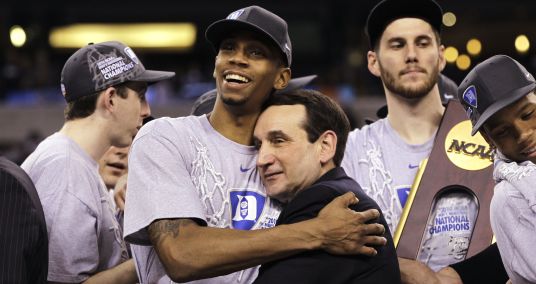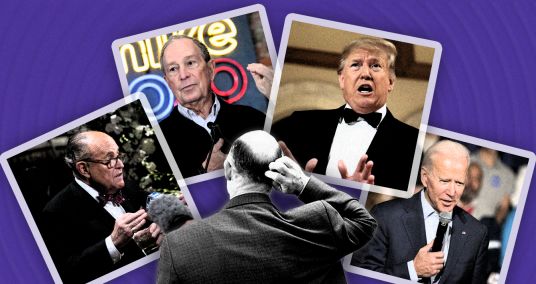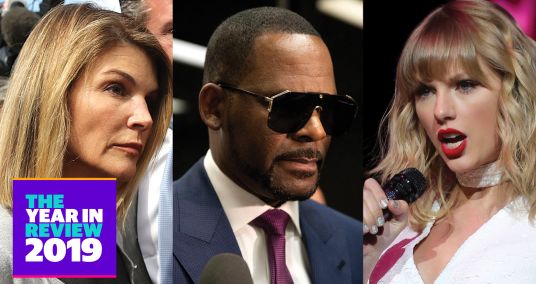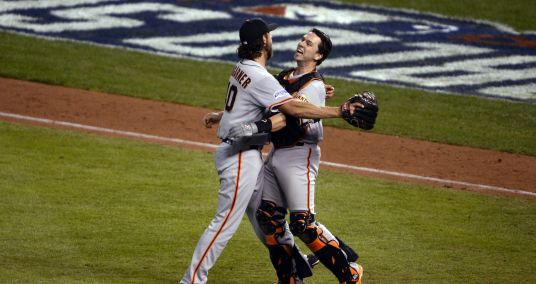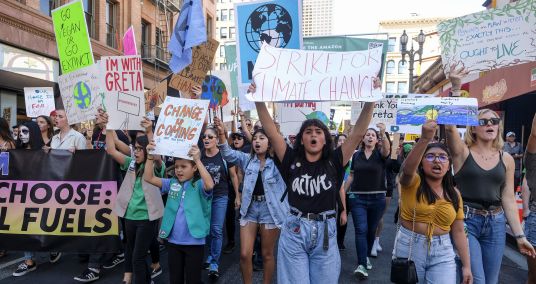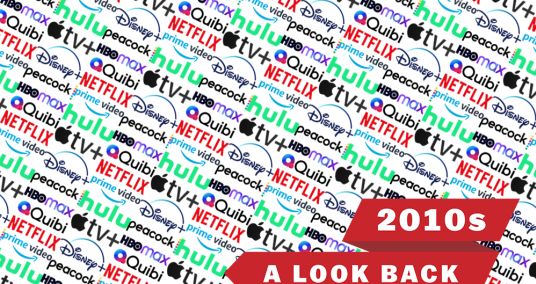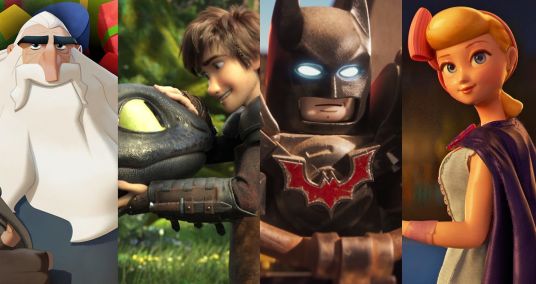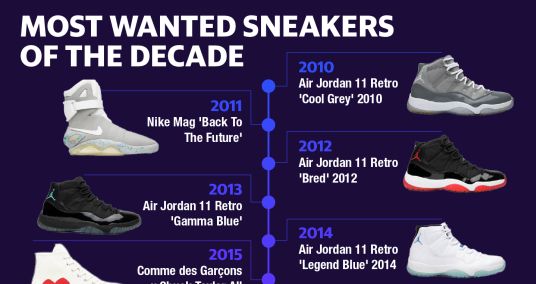- StyleHello Giggles
The 12 best Golden Globes beauty looks of the decade
From 2010-2019 we saw a wide array of beauty looks, from 90s inspired hair accessories and natural texture to wine-colored lids and blue hair. Here, we've rounded up our 12 favorite Golden Globes beauty looks of the decade.
- TechnologyTechCrunch
A look back at 10 years of CES
The mobile upstart launched its first smartphones, the Pre and Pixel, in 2009, and found a hardcore group of fans that loved the look of the devices, and all the features that set it apart from Android and iOS. Palm CEO Jon Rubenstein (one of the early pioneers at Apple making the iPod) made some waves onstage by claiming that he had never used an iPhone. Palm also saw its stock rise by 10% after it announced at a press conference that it would sell its devices through a lucrative deal with Ve
- WorldYahoo News 360
Did the world get better or worse in the 2010s?
One thing everyone can agree on is the past decade was eventful. But did civilization make progress in the 2010s or did the world move backward?
- EntertainmentINSIDER
39 of the most controversial and shocking events from the past decade that we're still talking about today
The last 10 years include dozens of controversies, including Jerry Sandusky's conviction, Anthony Wiener's sex scandals, and Hillary Clinton's emails.
- SportsYahoo Sports
The best fantasy players of the last decade, according to 'The People'
Matt Harmon looks back at the last 10 years in fantasy football and gives his assessment on The People's submission for the best players of the past decade in this week's Fantasy Football Survival Kit.
- EntertainmentIn The Know by Yahoo
Laurel vs. Yanny, Gangnam Style, the Dress and more: Relive the top 10 viral moments of the decade
As we bid farewell to the decade and say hello to a new one, it's time to take a good look back at all we've witnessed over the past 10 years.
10 min read - BusinessBusiness Insider
These were the biggest automotive stories of the 2010s
From Tesla's rise to the advent of self-driving vehicles, from Dieselgate to the arrival of Uber, the decade was action-packed.
- EntertainmentVariety
The Best Country Albums of 2019 … and of the Decade
Were we ready for the country? In 2019, the best efforts of veterans like Tanya Tucker, Rodney Crowell and Vince Gill and next-generation talents like Maren Morris, Yola and Kalie Shorr ensured we were. Here’s a ranking of some of the year’s finest country albums … followed by a genre best-of for the entire 2010s. […]
- EntertainmentThe Wrap
30 Most Memorable Rom-Coms of the 2010s, From ‘Easy A’ to ‘Crazy Rich Asians’ (Photos)
Hollywood studios have historically relied on typically cheaper and often endearing romantic comedy to fill out slates. The genre had its ups and downs during the 2000s, but studios and audiences rekindled their love affair with rom-coms over the course of the decade. Here’s a list of some of the most memorable romantic comedies from the 2010s.“Scott Pilgrim vs. the World” (2010) There are more than a few genre-bending films on this list, but maybe none more interesting and ambitious than “Scott
3 min read - EntertainmentEngadget
Streaming now accounts for 80 percent of the US music market
Streaming has completely reshaped the face of the music industry over the last decade, with the likes of Spotify and Apple Music proving to be overwhelmingly popular with music fans. The Recording Industry Association of America has revealed some stats that underline the mammoth sea change. The organization says streaming accounts for 80 percent of the US music market, compared with seven percent in 2010. Streaming subscriptions rose from about 1.5 million to around 61 million between 2010 and t
2 min read - EntertainmentHarper's Bazaar
The Biggest Royal Moments of the Past Decade
From royal weddings to royal babies and (just a few!) royal scandals.
- EntertainmentCBS News
Google's top trends of the decade
In 2010, people were buying their first iPads and catching Bieber Fever. A decade later, the trends are much different.
- EntertainmentThe Guardian
Power, precarity and white-hot anger: what I learned in a decade in journalism
You won’t make much money, your best stories will be forgotten, and you’ll be doomed to constant disappointment and despair. I recommend it highlyAs the decade of the 2010s began, I was ensconced in an exciting if modestly paid New York media job, writing every week about the recession-fueled layoffs and closures across the media world, while avoiding them personally. As the decade reached its end, I myself became a casualty of a publication closure and layoff, just another unemployed writer hus
- EntertainmentINSIDER
The 18 most heated celebrity feuds of the past decade
Between 2010 and 2020, there was no shortage of harsh words, pointed tweets, and even full-out fights between celebrities.
- BusinessThe Wrap
How Tech Giants Like Amazon and Facebook Became Wall Street Juggernauts in the Last Decade
The 2010s will be remembered as the decade tech companies became remarkably powerful — and valuable. Just take a look at where we were 10 years ago. In 2009, only one of the 10 most valuable companies in the world — Microsoft — was a tech company. Now, as we enter a new decade, six of the 10 most valuable companies are tech giants: Apple, Microsoft, Alphabet (the parent company of Google), Amazon, Facebook and Alibaba. What’s more, those six companies, in order, are the first through sixth most
- TechnologyUSA TODAY
How technology made us bid farewell to privacy in the last decade
The decade saw the addition of cameras, microphones and ultra-efficient tracking devices, connected doorbells and more.
- SportsAssociated Press
Villanova-North Carolina tops NCAA games of the decade
Increased parity in college basketball led to some of the greatest games in the sport's history during the 2010s, from massive upsets to moments that had fans screaming from their couches. The Tar Heels worked the ball to Marcus Paige, who made an off-balance, double-clutch 3-pointer to tie the game with 4.7 seconds. Paige's shot will go down as one of the most memorable 3-pointers in NCAA Tournament history, but it was upstaged by what happened next.
- EntertainmentHuffPost
Lizzo Reflects On Her Inspiring Journey: 'Anything Can Happen In A Decade'
"2009 was the year I lived in my car," the "Truth Hurts" singer tweeted, adding that she cried herself to sleep on Thanksgiving that year.
- SportsYahoo Sports
What LeBron James’ and Stephen Curry’s decade of dominance meant for the NBA
The league is defined as much by what LeBron and Curry did as what they pushed each other to do.
- PoliticsYahoo News Opinion
Head-scratching claims cap off a wild year in 2019 politics
The last week of 2019 was marked by a bumper crop of comments that might have benefited from a little fine-tuning in a focus group. Here, in no particular order, are a few that provoked more than the usual amount of head-scratching.
5 min read - EntertainmentYahoo Celebrity
Biggest celebrity scandals of 2019: college admissions, 'Surviving R. Kelly,' Taylor Swift feud and so many more
In 2019, the drama that happened offscreen in Hollywood rivaled that of what happened in even the most preposterous TV and movie plots.
- EntertainmentBusiness Insider
The worst ads of the decade
From Pepsi's unforgettable Kendall Jenner fiasco to Peloton's recent holiday ad gaffe, the worst ads often rang sexist, racist, or just tone-deaf.
- SciencePopular Mechanics
The Deep Space Decade: How a New Era of Exploration Came of Age in the 2010s
One of the most important discoveries of the 2010s will help us reshape our view of the cosmos
- LifestyleHuffPost Life
The Food Trends That Defined Us In The 2010s
Do you remember life before Sriracha or the Instant Pot?
- EntertainmentHuffPost Life
20 Of The 2010s’ Very Best Fashion And Beauty Trends
A look back at some of the defining beauty and style moments of the decade.
- SportsAssociated Press
Kentucky's 2012 college hoops team voted best of decade
The decade of college basketball started with Duke outlasting Butler in an epic national title game and ended with Virginia earning redemption after being on the wrong side of history the year before. John Calipari has built plenty of talented teams in Lexington. Led by long freshman Anthony Davis, the Wildcats tied an NCAA record with 38 victories, lost twice all season — by a combined eight points — and won the program's eighth national title.
- SportsYahoo Sports
Who was the team of the decade in MLB?
Is it the Giants for winning three World Series? The Cubs for breaking the curse? The Dodgers for seven straight division titles?
- ScienceHuffPost
7 Numbers Show How Dire Climate Change Got This Decade
From melting ice caps to record-breaking wildfires, hurricanes and floods, the deadly consequences of human-caused global warming are here.
- EntertainmentINSIDER
The most iconic royal weddings from the past decade
As well as Kate Middleton and Meghan Markle's weddings, the past decade also saw the first same-sex royal wedding.
- BusinessEngadget
Tech that defined the decade
2020 is just around the corner, and another decade will soon come to an end. A lot has happened over the past ten years, and not all of it was pleasant: 3D television came and went, the headphone jack slowly died and the intersection of tech and politics frequently became front-page news. But amidst the downers, there was still plenty of groundbreaking tech that came about between 2010 and now that have made an impact in our lives. Here's a not-at-all-comprehensive list of a few of them.
11 min read - SportsTime
My Top Sports Moment of the Decade: The Chicago Cubs Win the World Series
The Cubs' victory ended a 108-year streak without a championship
- ScienceAccuWeather
Unforgettable photos encapsulate weather nightmares turned to reality over the past decade
It was an active and costly decade when it came to extreme weather.The National Oceanic and Atmospheric Administration (NOAA) lists 115 billion-dollar weather and climate disasters from the past 10 years in the United States.Ferocious storm systems upended lives across the country and made towns such as Joplin, Missouri; Moore, Oklahoma; Mexico Beach, Florida; Montecito, California; and Seaside Heights, New Jersey; the center of unwanted global recognition.As these weather events took place, ter
- HealthINSIDER
10 diet myths overturned in the past decade, from 'fat makes you fat' to 'supplements are harmless'
Over the past 10 years, we've also come to learn that whole, unprocessed foods are healthiest and that BMI is a poor indicator of health.
- EntertainmentBusiness Insider
The 10 most popular YouTubers at the beginning of the decade — and where they are now
YouTube's most popular creators at the beginning of 2010 featured names like NigaHiga, Fred, and KevJumba.
- EntertainmentINSIDER
119 stories that gripped the world in the 2010s
Dozens of stories have made international headlines this past decade, from lighthearted royal weddings to tragedies like the Sandy Hook shooting.
- EntertainmentDeadline
Disruptor Of The Decade: How Streaming Changed Everything And Will Do It Again In The 2020s
Hollywood's unofficial wake-up call came on February 1, 2013, when Netflix dropped the first season of House of Cards in a single, binge-able chunk. While that distinctive release pattern hasn't yet become the official norm -- many new rivals to Netflix insist on the traditional episode-at-a-time approach -- the whole gestalt of the show signaled […]
- EntertainmentAssociated Press
The AP names its Breakthrough Entertainers of 2019
The dictionary defines “breakthrough” as a “sudden advance,” but The Associated Press' Breakthrough Entertainers of the Year spent lots of time preparing for their star-making moments. Megan Thee Stallion spent years rapping while also attending college. Megan Thee Stallion, Gottsagen and Quaid join actors Florence Pugh, Kaitlyn Dever, Barbie Ferreira and Jonathan Majors on the AP's third annual list of entertainers who memorably broke through to the mainstream this year.
- EntertainmentINSIDER
The 10 best movies for kids of 2019
Insider has watched a lot of family films and animated movies this year. From Disney to Netflix originals, here are the best we saw.
- HealthINSIDER
The best nutrition trends of 2019 that actually work
Not all diet advice is created equal. But there's some sound research behind trends including intermittent fasting and eating more garden weeds.
- EntertainmentTechCrunch
'Disney Plus’ was Google’s top US trending search term in 2019
Google today released its annual "Year in Search" data that takes a look back at some of the most notable searches of 2019. Specifically, Google looked at the biggest trends -- meaning, search terms that saw the largest spikes in traffic over a sustained period in 2019 compared to 2018. In the U.S., Disney's new streaming service "Disney Plus" was the biggest search trend of 2019, followed by Cameron Boyce, Nipsey Hussle, Hurricane Dorian, Antonio Brown, Luke Perry, Avengers: Endgame, Game of
- WorldYahoo News UK
In pictures: RSPCA reveals its favourite animal rescues of 2019
The charity has released images of its quirkiest rescues of the year, including a fox caught in a wheel and a greedy squirrel trapped in a bird feeder.
- BusinessYahoo Finance
The hottest housing market of 2019
Home sales price and rent surged in Phoenix this year.
5 min read - SportsYahoo Sports
Baker Mayfield, Jadeveon Clowney, Manti Te’o among Yahoo Sports' college football all-decade team
The past 10 years have been a lot of fun. And the next 10 years could be even more fun. Especially if the playoff expands to eight or even 16 teams at some point in the 2020s. As we conclude the 2010s, here is Yahoo Sports’ college football team of the decade.
- EntertainmentYahoo Sports
The 10 biggest sports choke jobs of the decade
The biggest sports choke job of the 2010s is obvious. (Looking at you, Atlanta Falcons.) But there were plenty other blown leads and failures under pressure.
- EntertainmentHuffPost Life
The 11 Best Shows From The 2010s You Can Stream Right Now
You can watch TV series that are highlights of the decade on Netflix, Hulu and Amazon Prime.
- EntertainmentIn The Know by Yahoo
From Glastonbury to 'Homecoming,' here are the 10 times Beyoncé dominated the 2010s
From announcing her first pregnancy at the VMAs to breaking the internet with her historic "Beychella" set, Queen Bey had this decade firmly in her grasp.
9 min read - EntertainmentYahoo Finance
The most-wanted sneakers of the decade: GOAT
Online sneaker platform GOAT shares its top sneakers of the decade.
- BusinessYahoo Finance
The 5 largest IPOs of the 2010s
The 2010s saw some huge companies hit the public markets. These, though, pulled in so much cash they're in a different class altogether.
- SportsYahoo Sports
MLB All-Decade Team: Current and former stars make their picks
Ryan Howard, Cliff Floyd, Marcus Semien, Kirby Yates and others pick their All-Decade team in MLB.
Advertisement
















